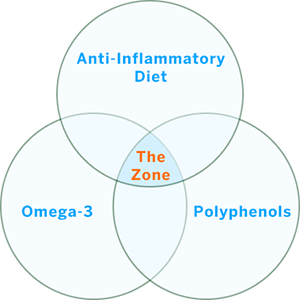Spotlight On: The Zone Diet
With the right type of balanced diet, your weight loss results can be focused directly on shedding fat, rather than muscle or water as is the case with so many diet systems. What’s more, you just might optimize your health in general. So says Barry Sears, PhD, the biochemist behind The Zone diet.

*Info sourced from www.ZoneDiet.com
In order to stay in The Zone, each meal and snack must have the same proportions of protein, carbs and fat. (To be exact, that equates to 30 percent protein, 30 percent fat, and 40 percent carbs.) Your first meal of the day should be eaten within an hour of waking up, and you should not go more than five hours throughout the day without eating.
In addition to the proportional requirements, The Zone diet also has caloric limits. Men may consume a maximum of 1,500 calories per day, while women are limited to 1,200. (Calorie limits may range slightly based on individual size.)
The Promise: Shed fat and fat alone (even while sleeping) while maintaining the perfect nutritional balance required to stay trim, healthy and functioning at peak performance levels.
The Perils: There are no serious health issues or nutritional shortfalls associated with The Zone due mainly to its focus on dietary balance. Ironically enough, this balance is also the diet’s biggest issue. The Zone diet must be followed exactly with little-to-no flexibility in order to achieve its promised results. This means that every single meal (and snack) must adhere to the 30 percent protein, 30 percent fat, 40 percent carb ratio, and be eaten within a specific time range. Failure to adhere to this strict nutritional portioning and timing can have a significant effect on results. Weight loss results are not dramatic with The Zone; nor are they immediate. Expect to lose one to two pounds per week when following the diet correctly.
There is concern that eating too much high-fat food (think red meat and bacon) can increase heart attack risk factors. If you have kidney disease, too much protein can further tax your kidneys; and compromise kidney function.
“Yes” Foods: The Zone diet requires a balanced mix of low-fat proteins, carbs that are low on the glycemic index, and small amounts of healthy fats. This includes skinless chicken breast, turkey and fish (low-fat proteins), fruits and vegetables (carbs), and olive oil, avocadoes, walnuts, flaxseeds and almonds (healthy fat).
“No” Foods: Although no foods are completely banned from The Zone diet, it is recommended that you avoid a number of counterproductive proteins, carbs and fats, such as egg yolks and fatty red meats, and high-sugar fruits and vegetables. For maximum effect, carbs like bread and pasta also should be kept to a minimum.
Sample Meal: Lunch a la Zone
4 cups of spinach
¼ cup of kidney beans
1 cup chopped tomatoes
2 ounces skinless turkey breast
1 ounce crumbled feta cheese
1 tablespoon of low-fat salad dressing
Since men require more calories, this lunch could be supplemented with a handful of chopped almonds or walnuts mixed with the salad, apple slices and a cup of milk.
Should you or shouldn’t you? Compared with many other diet options available, The Zone diet has the benefit of having no nutritional shortfalls. That said, you should always speak with a nutritionist or doctor before committing to any nutritional or dietary changes, to make sure the diet you’re considering serves your specific needs.
Further Reading:
Anti-Inflammatory Nutrition
Why Zone?


